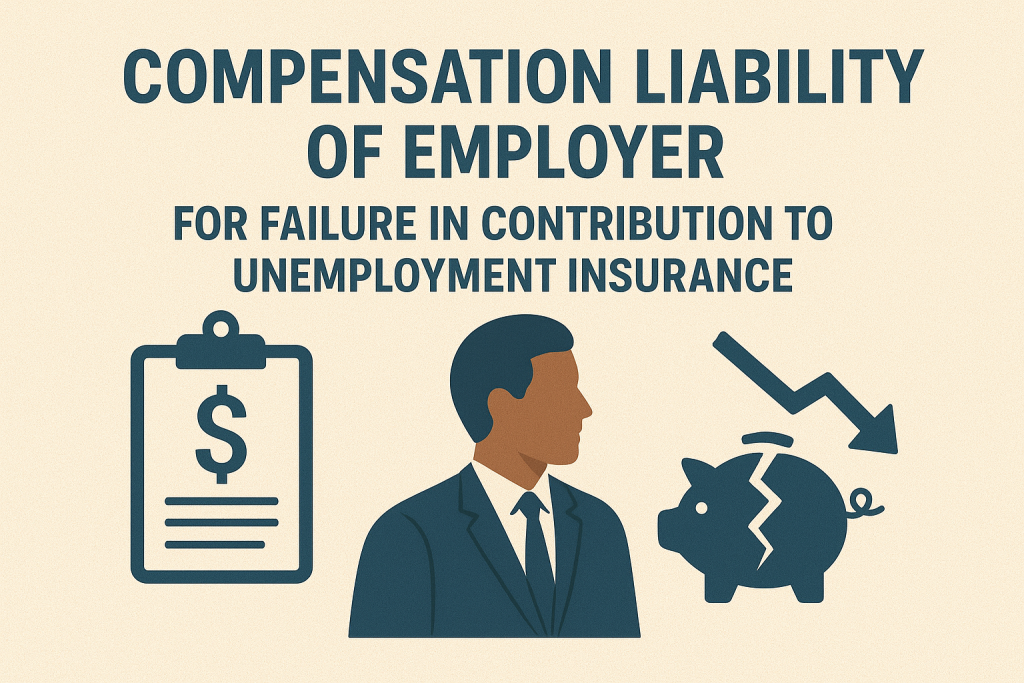
In today’s dynamic labor market, the role of unemployment insurance (UI) has become increasingly significant in providing financial security to workers during periods of job loss. Employers are mandated to contribute to these insurance programs, ensuring that employees receive necessary support when facing unemployment. However, failures in these contributions can lead to severe consequences, not only for the employees but also for employers who may face legal and financial liabilities. This paper explores the compensation liability of employers for their failure to contribute to unemployment insurance, highlighting the legal frameworks, the implications of non-compliance, and the potential repercussions on both parties involved.
- Liability of employer to compensate for failure to fully contribute to unemployment insurance
Enterprise, in its capacity as the employing entity, is obliged to pay unemployment insurance premiums for its employees. Under the Law on Employment 2025, effective from January 1, 2026, the maximum contribution rate to the unemployment insurance fund is 1% of the monthly wage fund of employees participating in the scheme. Employers are required to remit unemployment insurance contributions on a monthly basis, concurrently with the payment of compulsory social insurance.
To ensure timely settlement of unemployment insurance benefits upon the termination of an employment contract, a working contract, or cessation of employment, the employer must make full and punctual contributions to the unemployment insurance fund in accordance with the law.
In cases where the employer fails to fulfill such contribution obligations, thereby rendering the employee ineligible for unemployment insurance benefits, the employer shall bear corresponding compensation liability. The amount of compensation payable to the employee shall be equivalent to the unemployment insurance benefits that the employee would have been entitled to under the law.
- Obligation of employer to contribute to unemployment insurance during work suspension
The suspension of work by an employee does not automatically grant the employer the right to suspend the payment of unemployment insurance contributions. In accordance with point b, Clause 1, Article 34 of the Law on Employment 2025: “In cases where an employee, during a period of work suspension, continues to receive a monthly salary equal to or higher than the lowest salary used as the basis for compulsory social insurance contributions, the unemployment insurance contribution shall be calculated based on the salary actually paid during the suspension period.”
In cases where an employee is held in custody or temporarily suspended from work while participating in unemployment insurance, the employer may temporarily suspend the corresponding contributions. However, once the employee receives back pay, the employer must make full back payment of unemployment insurance premiums for the corresponding period. The payable amount shall be determined based on the premiums due for the months in which contributions were suspended, and payment shall be made concurrently with the back payment of compulsory social insurance.
- Sanctions imposed on employer for late payment or evasion of unemployment insurance contribution
Acts of late payment or evasion of unemployment insurance contributions by employers are deemed violations of law and subject to corresponding sanctions, including: (i) mandatory payment of the full amount of unpaid or evaded contributions; and (ii) payment of interest at a rate of 0.03% per day on the unpaid or evaded amount, calculated based on the number of days of delay or evasion.
Pursuant to Law on Social Insurance 2024, the two violations of “late payment” and “evasion of contributions” are distinguished as follows:
Late payment refers to any of the following: (i) failure to pay or underpayment of the required contribution amount after the statutory payment deadline; (ii) failure to register, or incomplete registration, of all employees required to participate in insurance within 60 days after the statutory deadline; or (iii) other violations that are not deemed to constitute evasion of contributions.
Evasion of contributions refers to any of the following acts aimed at avoiding or underpaying insurance contributions: (i) failure to register, or incomplete registration, of all employees required to participate in unemployment insurance for more than 60 days after the statutory deadline; (ii) declaring wages for unemployment insurance contribution purposes at a level lower than prescribed; (iii) failure to pay or underpayment of registered unemployment insurance contributions for more than 60 days after the latest statutory payment deadline; or
(iv) other cases as provided by law.
The promulgation of the Law on Employment 2025 marks a significant advancement in Vietnam’s labor law framework, particularly in strengthening social protection for employees. The law tightens employers’ obligations to contribute to unemployment insurance by introducing compensation liability for non-compliance, enhancing recovery and interest calculation mechanisms, and reinforcing sanctions for violations. Employers are therefore advised to stay updated on legal requirements, ensure full compliance, and improve their risk management systems to safeguard employees’ legitimate rights and interests while mitigating potential legal and financial risks.
In conclusion, the failure of employers to contribute to unemployment insurance represents a critical issue that can have far-reaching implications for both employees and employers. The legal liabilities that arise from such failures underscore the importance of compliance with employment laws and regulations. As society continues to evolve and the workforce becomes more complex, it is imperative for employers to recognize their responsibilities and ensure that they fulfill their obligations to contribute to unemployment insurance. This not only protects the rights and welfare of employees but also shields employers from potential legal repercussions, fostering a more stable and equitable labor market.
📞 CONTACT LEGAL CONSULTANT:
TLA Law is a leading law firm with a team of highly experienced lawyers specializing in criminal, civil, corporate, marriage and family law, and more. We are committed to providing comprehensive legal support and answering all your legal questions. If you have any further questions, please do not hesitate to contact us.
1. Lawyer Vu Thi Phuong Thanh, Manager of TLA Law LLC, Ha Noi Bar Association
Email: vtpthanh@tlalaw.vn
2. Lawyer Tran My Le, Chairman of the Members’ Council, Ha Noi Bar Association
Email: tmle@tlalaw.vn.
Dinh Phuong Thao

